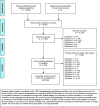The impact of mental health and psychosocial support programmes on children and young people's mental health in the context of humanitarian emergencies in low- and middle-income countries: A systematic review and meta-analysis
- PMID: 38572260
- PMCID: PMC10988149
- DOI: 10.1017/gmh.2024.17
The impact of mental health and psychosocial support programmes on children and young people's mental health in the context of humanitarian emergencies in low- and middle-income countries: A systematic review and meta-analysis
Abstract
Humanitarian emergencies pose a significant global health challenge for children and young people's mental and psychological health. This systematic review investigates the effectiveness of mental health and psychosocial support (MHPSS) programmes delivered to children and young people affected by humanitarian emergencies in low- and middle-income countries (LMICs). Twelve electronic databases, key websites and citation checking were undertaken. Forty-three randomised controlled trials (RCTs) published in English between January 1980 and May 2023 were included in the review. Overall, the findings suggest that cognitive behavioural therapy may improve depression symptoms in children and young people affected by humanitarian emergencies. Narrative exposure therapy may reduce feelings of guilt. However, the impact of the other MHPSS modalities across outcomes is inconsistent. In some contexts, providing psychosocial programmes involving creative activities may increase the symptoms of depression in children and young people. These findings emphasise the need for the development of MHPSS programmes that can safely and effectively address the diverse needs of children and young people living in adversarial environments.
Keywords: Children; Humanitarian Emergencies; Mental Health; Systematic review; Young people.
© The Author(s) 2024.
Conflict of interest statement
A.J. has a project funded by the National Institute for Health Research ARC North Thames. This report is independent research supported by the National Institute for Health Research ARC North Thames. The views expressed in this publication are those of the author(s) and not necessarily those of the National Institute for Health Research or the Department of Health and Social Care. A.J. has a studentship funded by the Economic Social research council via the London Interdisciplinary Social Science Doctoral Training Partnership. Grant award number: ES/P000703/1 – PR – 2,462,475.
Figures
References
-
- Ahmadi SJ, Jobson L, Musavi Z, Rezwani SR, Amini FA, Earnest A, Samim N, Sarwary SAA, Sarwary SA and McAvoy D (2023) Effect of the memory training for recovery–adolescent intervention vs treatment as usual on psychiatric symptoms among adolescent girls in Afghanistan: A randomized clinical trial. JAMA Network Open 6, e236086–e236086. - PMC - PubMed
-
- Allen J, Balfour R, Bell R and Marmot M (2014) Social determinants of mental health. International Review of Psychiatry 26, 392–407. - PubMed
-
- Annan J, Sim A, Puffer ES, Salhi C and Betancourt TS (2017) Improving mental health outcomes of Burmese migrant and displaced children in Thailand: A community-based randomized controlled trial of a parenting and family skills intervention. Prevention Science 18, 793–803. - PubMed
LinkOut - more resources
Full Text Sources



